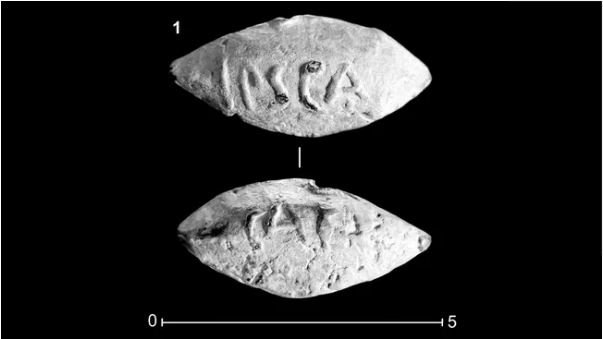Archaeologists have unearthed a 2,000-year-old lead bullet inscribed with the Latin version of Julius Caesar’s name in what is now Montilla, Spain.
The unexpected find, which along with the inscription CAES, short for Caesar, also contains the name of the local city IPSCA. This likely means that at least some of the area’s indigenous people supported the dictator in his civil war to claim absolute control over the Roman Empire over 2,000 years ago.
2,000-year-old Bullet Found Near Site of Decisive Battle of Munda
It is historically well-accepted that Caesar waged war for Rome in the Gaelic Wars between 58 and 50 B.C. before returning to lead a revolution to take control of the empire for himself. Historians often mark his crossing of the Rubicon River on January 10th, 49 B.C., as the beginning of this ultimately successful revolt.
Still, it was often assumed that the majority of the indigenous peoples in what is now Spain supported Rome’s Pompey the Great, who declared Caesar’s crossing of the Rubicon as an act of war. In fact, the lone previous lead bullet from this area inscribed with Caesar’s name contains the inscription CAE/ACIPE, which is the Latin equivalent of “Suck it, Caesar.”
Historians attribute that bullet to Pompey’s troops and its inscription as a message to the Roman leader’s enemies. Such communication built into slingshots, often referred to as “glans inscripta,” was not uncommon, the researchers behind this latest find explain.
“In the 1st century BC, many inscribed glandes were made because they were very useful instruments for housing short, very specific messages,” said study lead author Javier Moralejo Ordax, an assistant professor of archaeology at the Autonomous University of Madrid. In this case, the researchers guess that the message on the 2,000-year-old lead bullet may have been propaganda encouraging Caesar’s supporters that they were on the right side of the conflict.
Significantly, this particular glans was found in the southern part of Spain called Andalusia, an area known as the site of the final battle of the revolt, which took place on March 17, 45 B.C. Dubbed the Battle of Munda, this decisive engagement resulted in the death of tens of thousands of Pompey’s troops, culminating with Caesar’s final triumphant march into Rome itself.
Ancient Munition May Have Been Part of a Key Turning Point in Human History
In their published study, which appears in the journal Zephyrvs, Ordax and his colleagues note that the town of IPSCA inscribed on the 2,000-year-old lead bullet is not mentioned in the historical accounts of Caesar’s civil war.
Measuring 1.8 by 0.8 inches (4.5 by 2 centimeters) and weighing 2.5 ounces (71 grams), the bullet was actually made by pouring molten lead into a preformed mold. In this case, the mold would have included the inscription, with ISPCA on one side and CAES on the other, resulting in the perfectly inscribed lead bullet.
Significantly, the researchers observed that one end of the lead bullet was damaged, meaning it was likely damaged when it was fired into something hard like stone or even bone. The location of the find is also significant, as the town of Montilla is considered the probable location of Munda, the site of the decisive battle in Caesar’s time.
While little is known about this specific 2,000-year-old lead bullet, some historians suspect that it means the indigenous peoples of ISPCA not only supported Caesar’s rebellion but actually provided munitions and troops for the effort. Given that the Battle of Munda proved decisive in Caesar’s revolt, this bullet may have even been part of one of the most significant turning points in human history.
Christopher Plain is a Science Fiction and Fantasy novelist and Head Science Writer at The Debrief. Follow and connect with him on X, learn about his books at plainfiction.com, or email him directly at christopher@thedebrief.org.

